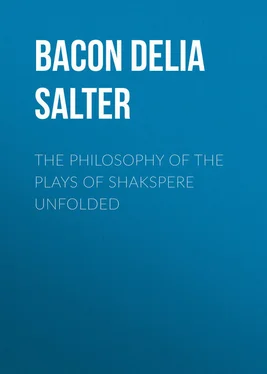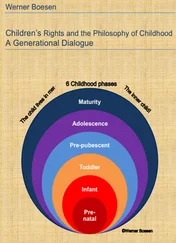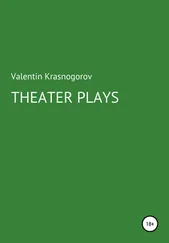Delia Bacon - The Philosophy of the Plays of Shakspere Unfolded
Здесь есть возможность читать онлайн «Delia Bacon - The Philosophy of the Plays of Shakspere Unfolded» — ознакомительный отрывок электронной книги совершенно бесплатно, а после прочтения отрывка купить полную версию. В некоторых случаях можно слушать аудио, скачать через торрент в формате fb2 и присутствует краткое содержание. Жанр: literature_19, foreign_antique, foreign_prose, на английском языке. Описание произведения, (предисловие) а так же отзывы посетителей доступны на портале библиотеки ЛибКат.
- Название:The Philosophy of the Plays of Shakspere Unfolded
- Автор:
- Жанр:
- Год:неизвестен
- ISBN:нет данных
- Рейтинг книги:3 / 5. Голосов: 1
-
Избранное:Добавить в избранное
- Отзывы:
-
Ваша оценка:
- 60
- 1
- 2
- 3
- 4
- 5
The Philosophy of the Plays of Shakspere Unfolded: краткое содержание, описание и аннотация
Предлагаем к чтению аннотацию, описание, краткое содержание или предисловие (зависит от того, что написал сам автор книги «The Philosophy of the Plays of Shakspere Unfolded»). Если вы не нашли необходимую информацию о книге — напишите в комментариях, мы постараемся отыскать её.
The Philosophy of the Plays of Shakspere Unfolded — читать онлайн ознакомительный отрывок
Ниже представлен текст книги, разбитый по страницам. Система сохранения места последней прочитанной страницы, позволяет с удобством читать онлайн бесплатно книгу «The Philosophy of the Plays of Shakspere Unfolded», без необходимости каждый раз заново искать на чём Вы остановились. Поставьте закладку, и сможете в любой момент перейти на страницу, на которой закончили чтение.
Интервал:
Закладка:
CHAPTER I
'One time will owe another.' — Coriolanus .
This work is designed to propose to the consideration, not of the learned world only, but of all ingenuous and practical minds, a new development of that system of practical philosophy from which THE SCIENTIFIC ARTS of the Modern Ages proceed, and which has already become, just to the extent to which it has been hitherto opened, the wisdom, – the universally approved, and practically adopted, Wisdom of the Moderns .
It is a development of this philosophy, which was deliberately postponed by the great Scientific Discoverers and Reformers, in whose Scientific Discoveries and Reformations our organised advancements in speculation and practice have their origin; – Reformers, whose scientific acquaintance with historic laws forbade the idea of any immediate and sudden cures of the political and social evils which their science searches to the root, and which it was designed to eradicate.
The proposition to be demonstrated in the ensuing pages is this: That the new philosophy which strikes out from the Court – from the Court of that despotism that names and gives form to the Modern Learning, – which comes to us from the Court of the last of the Tudors and the first of the Stuarts, – that new philosophy which we have received, and accepted, and adopted as a practical philosophy, not merely in that grave department of learning in which it comes to us professionally as philosophy, but in that not less important department of learning in which it comes to us in the disguise of amusement, – in the form of fable and allegory and parable, – the proposition is, that this Elizabethan philosophy is, in these two forms of it, – not two philosophies, – not two Elizabethan philosophies, not two new and wondrous philosophies of nature and practice, not two new Inductive philosophies, but one, – one and the same: that it is philosophy in both these forms, with its veil of allegory and parable, and without it; that it is philosophy applied to much more important subjects in the disguise of the parable, than it is in the open statement; that it is philosophy in both these cases, and not philosophy in one of them, and a brutish, low-lived, illiterate, unconscious spontaneity in the other.
The proposition is that it proceeds, in both cases, from a reflective deliberative, eminently deliberative, eminently conscious, designing mind; and that the coincidence which is manifest not in the design only, and in the structure, but in the detail to the minutest points of execution, is not accidental.
It is a proposition which is demonstrated in this volume by means of evidence derived principally from the books of this philosophy – books in which the safe delivery and tradition of it to the future was artistically contrived and triumphantly achieved: – the books of a new 'school' in philosophy; books in which the connection with the school is not always openly asserted; books in which the true names of the authors are not always found on the title-page; – the books of a school, too, which was compelled to have recourse to translations in some cases, for the safe delivery and tradition of its new learning.
The facts which lie on the surface of this question, which are involved in the bare statement of it, are sufficient of themselves to justify and command this inquiry.
The fact that these two great branches of the philosophy of observation and practice, both already virtually recognised as that, – the one openly, subordinating the physical forces of nature to the wants of man, changing the face of the earth under our eyes, leaving behind it, with its new magic, the miracles of Oriental dreams and fables; – the other, under its veil of wildness and spontaneity, under its thick-woven veil of mirth and beauty, with its inducted precepts and dispersed directions, insinuating itself into all our practice, winding itself into every department of human affairs; speaking from the legislator's lips, at the bar, from the pulpit, – putting in its word every where, always at hand, always sufficient, constituting itself, in virtue of its own irresistible claims and in the face of what we are told of it, the oracle, the great practical, mysterious, but universally acknowledged, oracle of our modern life; the fact that these two great branches of the modern philosophy make their appearance in history at the same moment, that they make their appearance in the same company of men – in that same little courtly company of Elizabethan Wits and Men of Letters that the revival of the ancient learning brought out here – this is the fact that strikes the eye at the first glance at this inquiry.
But that this is none other than that same little clique of disappointed and defeated politicians who undertook to head and organize a popular opposition against the government, and were compelled to retreat from that enterprise, the best of of them effecting their retreat with some difficulty, others failing entirely to accomplish it, is the next notable fact which the surface of the inquiry exhibits. That these two so illustrious branches of the modern learning were produced for the ostensible purpose of illustrating and adorning the tyrannies which the men, under whose countenance and protection they are produced, were vainly attempting, or had vainly attempted to set bounds to or overthrow, is a fact which might seem of itself to suggest inquiry. When insurrections are suppressed, when 'the monstrous enterprises of rebellious subjects are overthrown, then FAME, who is the posthumous sister of the giants , – the sister of defeated giants springs up'; so a man who had made some political experiments himself that were not very successful, tells us.
The fact that the men under whose patronage and in whose service 'Will the Jester' first showed himself, were men who were secretly endeavouring to make political capital of that new and immense motive power, that not yet available, and not very easily organised political power which was already beginning to move the masses here then, and already threatening, to the observant eye, with its portentous movement, the foundations of tyranny, the fact, too, that these men were understood to have made use of the stage unsuccessfully as a means of immediate political effect, are facts which lie on the surface of the history of these works, and unimportant as it may seem to the superficial enquirer, it will be found to be anything but irrelevant as this inquiry proceeds. The man who is said to have contributed a thousand pounds towards the purchase of the theatre and wardrobe and machinery, in which these philosophical plays were first exhibited, was obliged to stay away from the first appearance of Hamlet, in the perfected excellence of the poetic philosophic design, in consequence of being immured in the Tower at that time for an attempt to overthrow the government. This was the ostensible patron and friend of the Poet; the partner of his treason was the ostensible friend and patron of the Philosopher. So nearly did these philosophic minds, that were 'not for an age but for all time,' approach each other in this point. But the protégé and friend and well-nigh adoring admirer of the Poet , was also the protégé and friend and well-nigh adoring admirer of the Philosopher. The fact that these two philosophies, in this so close juxta-position, always in contact, playing always into each other's hands, never once heard of each other, know nothing of each other, is a fact which would seem at the first blush to point to the secret of these 'Know-Nothings,' who are men of science in an age of popular ignorance, and therefore have a 'secret'; who are men of science in an age in which the questions of science are 'forbidden questions,' and are therefore of necessity 'Know-Nothings.'
Читать дальшеИнтервал:
Закладка:
Похожие книги на «The Philosophy of the Plays of Shakspere Unfolded»
Представляем Вашему вниманию похожие книги на «The Philosophy of the Plays of Shakspere Unfolded» списком для выбора. Мы отобрали схожую по названию и смыслу литературу в надежде предоставить читателям больше вариантов отыскать новые, интересные, ещё непрочитанные произведения.
Обсуждение, отзывы о книге «The Philosophy of the Plays of Shakspere Unfolded» и просто собственные мнения читателей. Оставьте ваши комментарии, напишите, что Вы думаете о произведении, его смысле или главных героях. Укажите что конкретно понравилось, а что нет, и почему Вы так считаете.












